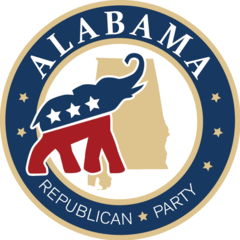
The 1964 United States presidential election was the 45th quadrennial presidential election. It was held on Tuesday, November 3, 1964. Incumbent Democratic President Lyndon B. Johnson defeated Republican Senator Barry Goldwater in a landslide victory. Johnson was the fourth and most recent vice president to succeed the presidency following the death of his predecessor and win a full term in his own right. Johnson won the largest share of the popular vote for the Democratic Party in history at 61.1%. As of 2024, this remains the highest popular vote percentage of any candidate since the advent of widespread popular elections in 1824.

In American politics, the Southern strategy was a Republican Party electoral strategy to increase political support among white voters in the South by appealing to racism against African Americans. As the civil rights movement and dismantling of Jim Crow laws in the 1950s and 1960s visibly deepened existing racial tensions in much of the Southern United States, Republican politicians such as presidential candidate Richard Nixon and Senator Barry Goldwater developed strategies that successfully contributed to the political realignment of many white, conservative voters in the South who had traditionally supported the Democratic Party. The strategy also helped to push the Republican Party much more to the right relative to the 1950s. By winning all of the South, a presidential candidate could obtain the presidency with minimal support elsewhere.

The Solid South was the electoral voting bloc for the Democratic Party in the Southern United States between the end of the Reconstruction era in 1877 and the Civil Rights Act of 1964. During this period, the Democratic Party controlled southern state legislatures and most local, state and federal officeholders in the South were Democrats. During the late 19th century and early 20th century, Southern Democrats disenfranchised nearly all blacks in all the former Confederate states. This resulted in a one-party system, in which a candidate's victory in Democratic primary elections was tantamount to election to the office itself. White primaries were another means that the Democrats used to consolidate their political power, excluding blacks from voting.

The politics of the Southern United States generally refers to the political landscape of the Southern United States. The institution of slavery had a profound impact on the politics of the Southern United States, causing the American Civil War and continued subjugation of African-Americans from the Reconstruction era to the Civil Rights Act of 1964. Scholars have linked slavery to contemporary political attitudes, including racial resentment. From the Reconstruction era to the Civil Rights Act of 1964, pockets of the Southern United States were characterized as being "authoritarian enclaves".
The 8th congressional district of Tennessee is a congressional district in West Tennessee. It has been represented by Republican David Kustoff since January 2017. The district appears rural on a map, but the bulk of its vote is cast in the suburban and exurban areas around Memphis, such as Germantown, Bartlett, and Collierville, as well as Fayette and Tipton counties. This area boasts some of the highest median incomes in the state.

The Tennessee Democratic Party (TNDP) is the affiliate of the Democratic Party in Tennessee. The party was founded in 1826 initially as the Jacksonian Party. The Tennessee Democratic Party was born out of President Andrew Jackson's populist philosophy of Jacksonian democracy in the mid to late-1820s. After Jackson left office, the Democratic Party struggled in the state as the Whig Party would go on to be the dominant party in Tennessee until its collapse after the 1852 Election. Prior to the Civil War, as a result of the collapse of the former Whig Party, the Democratic Party became the dominant party in the state. After the war ended, the Republican Party would be the dominant political party during Reconstruction, but once Reconstruction ended, the Democratic Party would dominate Tennessee Politics up until 2011 when the Republican Party would gain firm control of Tennessee State Government.

The Alabama Republican Party is the state affiliate of the Republican Party in Alabama. It is the dominant political party in Alabama. The state party is governed by the Alabama Republican Executive Committee. The committee usually meets twice a year. As of the February 23, 2019 meeting in Birmingham, the committee is composed of 463 members. Most of the committee's members are elected in district elections across Alabama. The district members are elected in the Republican Primary once every four years, with the most recent election for the committee having been on June 5, 2018. The new committee takes office following the general election in November 2018. In addition, all 67 county GOP chairmen have automatic seats as voting members. The state chairman can appoint 10 members. Each county committee can appoint bonus members based on a formula that theoretically could add 312 seats, although that formula currently calls for only about 50 seats.

The 2010 United States House of Representatives elections in Tennessee was held on November 2, 2010, to elect the nine U.S. representatives from the state of Tennessee, one from each of the state's nine congressional districts.

The 2012 United States House of Representatives elections in Tennessee was held on Tuesday, November 6, 2012, to elect the nine U.S. representatives from the state of Tennessee, one from each of the state's nine congressional districts. The elections coincided with the elections of other federal and state offices, including a quadrennial presidential election and an election to the U.S. Senate. Primary elections were held on August 2, 2012.

The 2014 United States Senate election in Tennessee took place on November 4, 2014, to elect a member of the United States Senate from the State of Tennessee. Incumbent Republican U.S. Senator Lamar Alexander defeated Democrat Gordon Ball, and was re-elected to a third term in office with 61.9% of the vote against 31.9%.

The 1988 United States presidential election in Tennessee took place on November 8, 1988. All 50 states and the District of Columbia were part of the 1988 United States presidential election. Tennessee voters chose 11 electors to the Electoral College, which selected the president and vice president. Tennessee was won by incumbent United States Vice President George H. W. Bush of Texas, who was running against Massachusetts Governor Michael Dukakis. Bush ran with Indiana Senator Dan Quayle as Vice President, and Dukakis ran with Texas Senator Lloyd Bentsen.

The 2016 United States House of Representatives elections in Tennessee was held on November 8, 2016, to elect the nine U.S. representatives from the state of Tennessee, one from each of the state's nine congressional districts. The elections coincided with the elections of other federal and state offices, including President of the United States. The primaries were held on August 4.

Elections in Tennessee are held to fill various local, state, and federal seats. Special elections may be held to fill vacancies at other points in time. Statewide legislative referrals and referendums may also be on the ballot in some elections. Tennessee is one of thirteen states that holds its presidential primaries on Super Tuesday.

The 1956 United States presidential election in Alabama took place on November 6, 1956, as part of the 1956 United States presidential election. Alabama voters chose eleven representatives, or electors, to the Electoral College, who voted for president and vice president. In Alabama, voters voted for electors individually instead of as a slate, as in the other states.

The 1952 United States presidential election in Tennessee took place on November 4, 1952, as part of the 1952 United States presidential election. Tennessee voters chose 11 representatives, or electors, to the Electoral College, who voted for president and vice president.

The 1948 United States presidential election in Tennessee took place on November 2, 1948, as part of the 1948 United States presidential election. Tennessee voters chose 12 representatives, or electors, to the Electoral College, who voted for president and vice president.

The 1944 United States presidential election in North Carolina took place on November 7, 1944, as part of the 1944 United States presidential election. North Carolina voters chose 14 representatives, or electors, to the Electoral College, who voted for president and vice president.

The 1936 United States presidential election in North Carolina took place on November 3, 1936, as part of the 1936 United States presidential election. North Carolina voters chose 13 representatives, or electors, to the Electoral College, who voted for president and vice president.

The 1932 United States presidential election in Alabama took place on November 8, 1932, as part of the nationwide presidential election. Alabama voters chose eleven representatives, or electors, to the Electoral College, who voted for president and vice president. In Alabama, voters voted for electors individually instead of as a slate, as in the other states.

The 1932 United States presidential election in Tennessee took place on November 8, 1932, as part of the 1932 United States presidential election. Tennessee voters chose 11 representatives, or electors, to the Electoral College, who voted for president and vice president.








